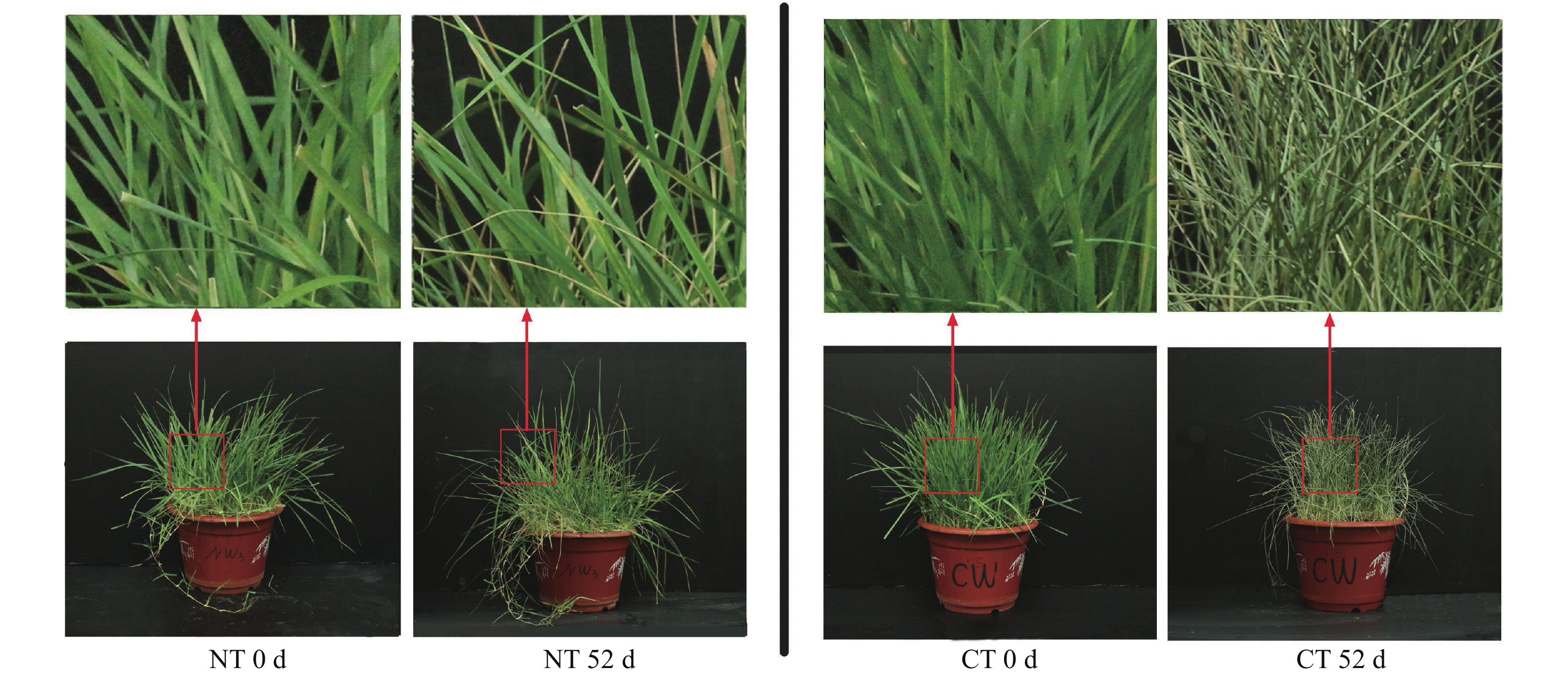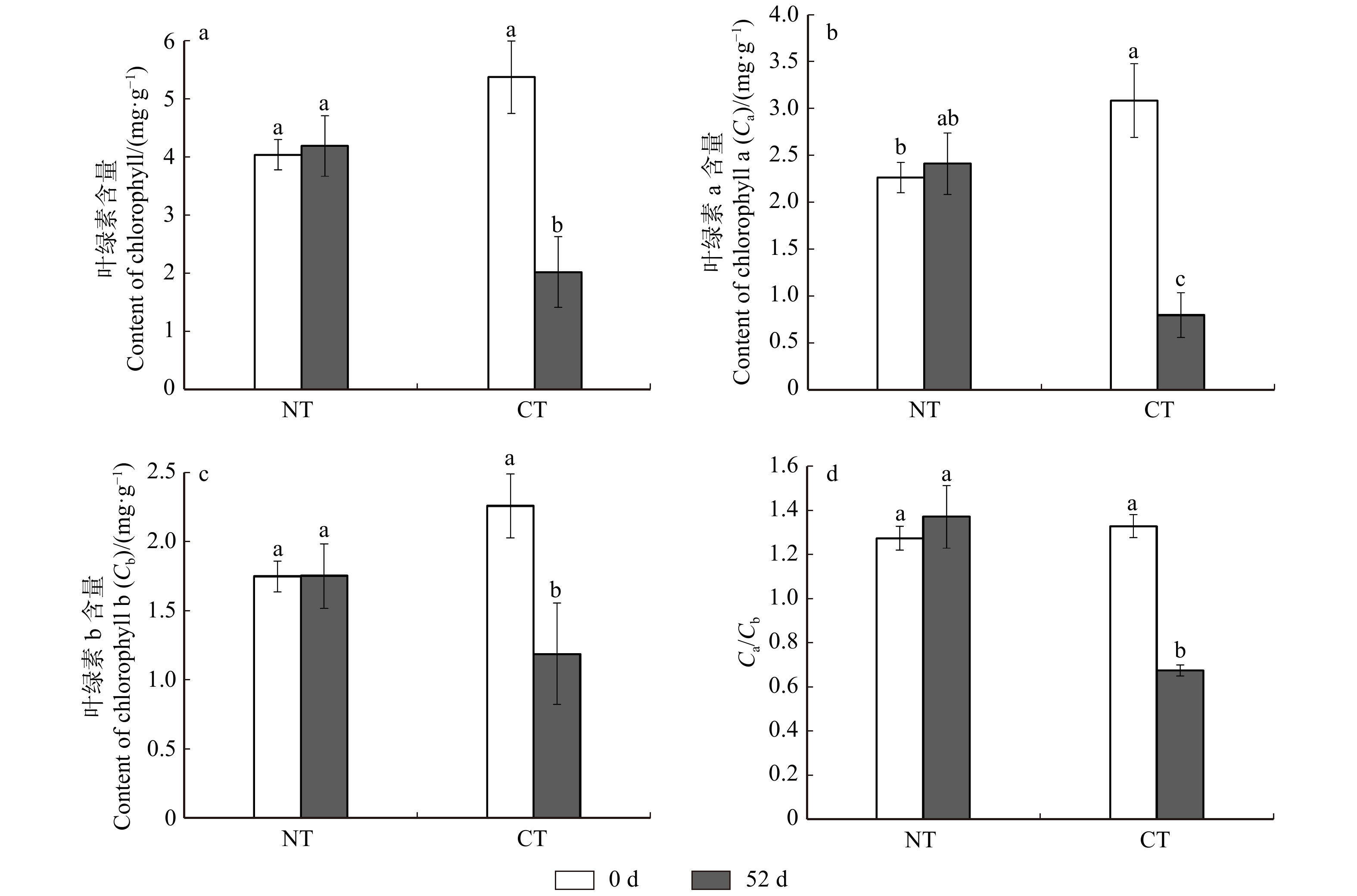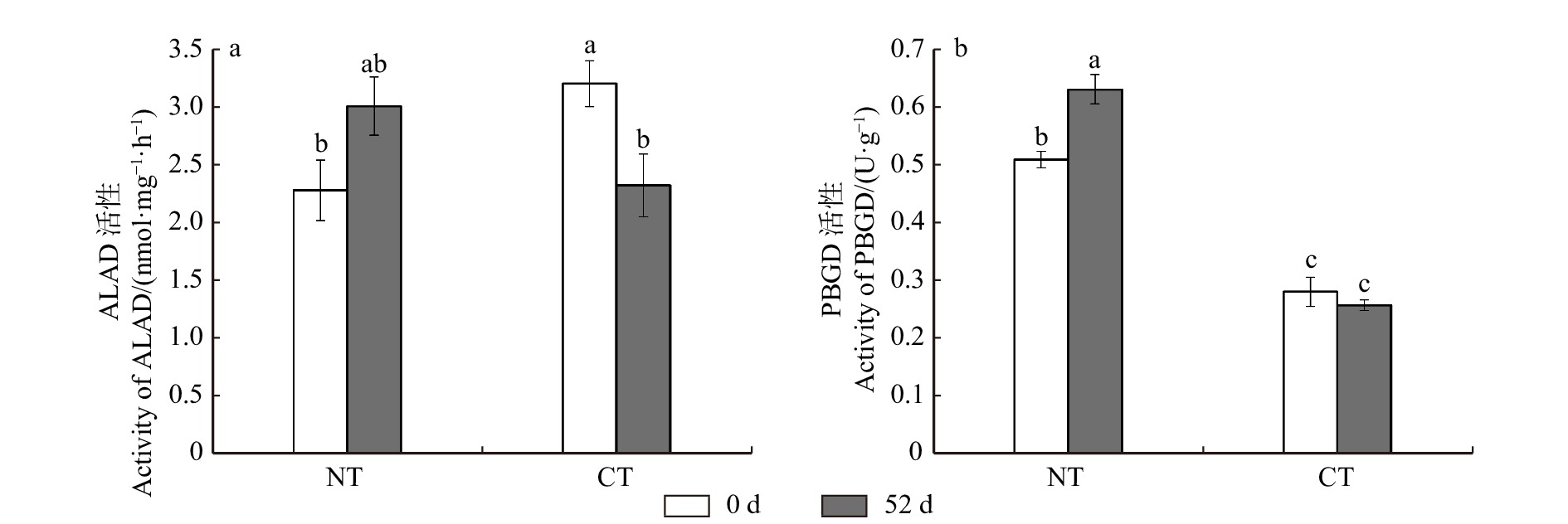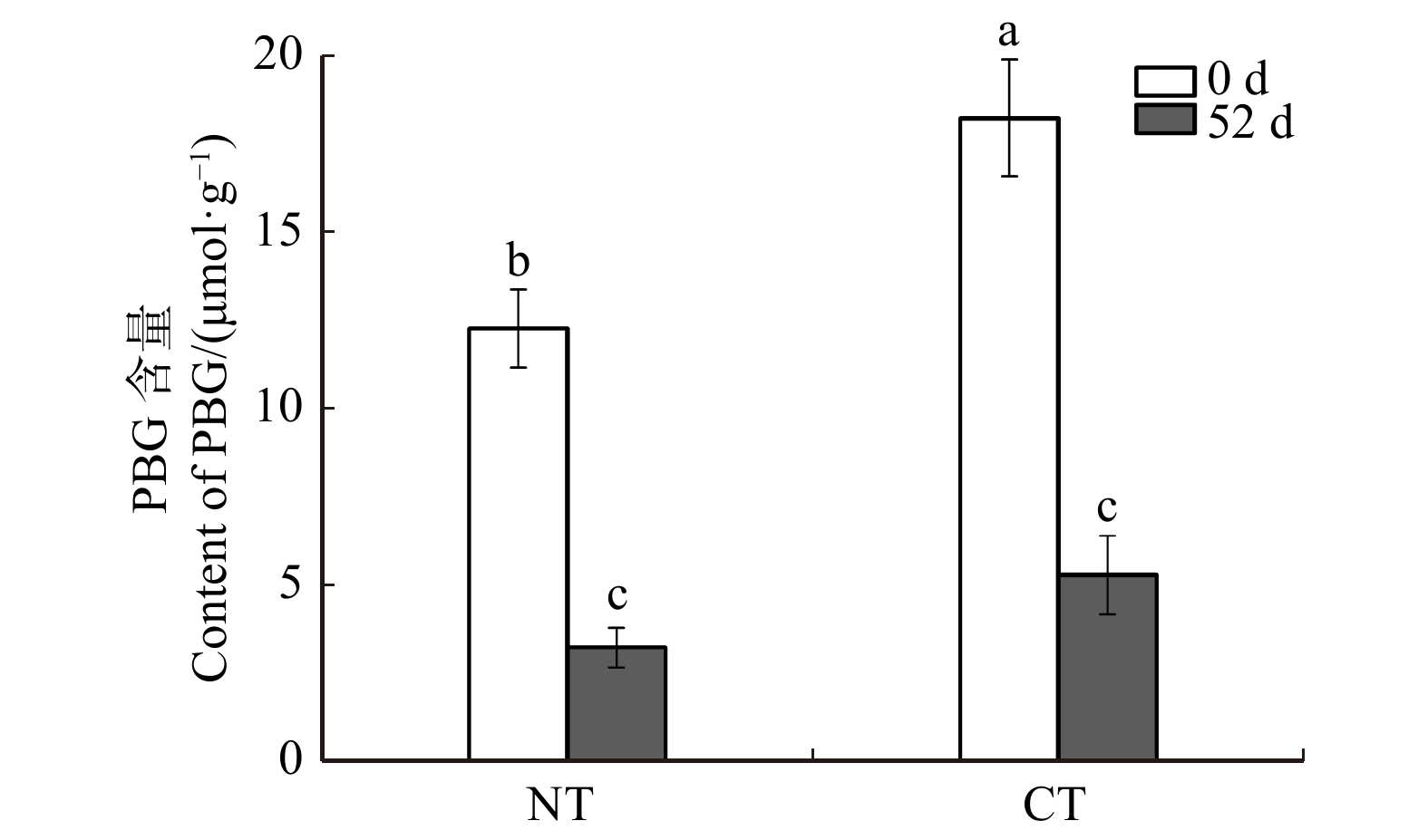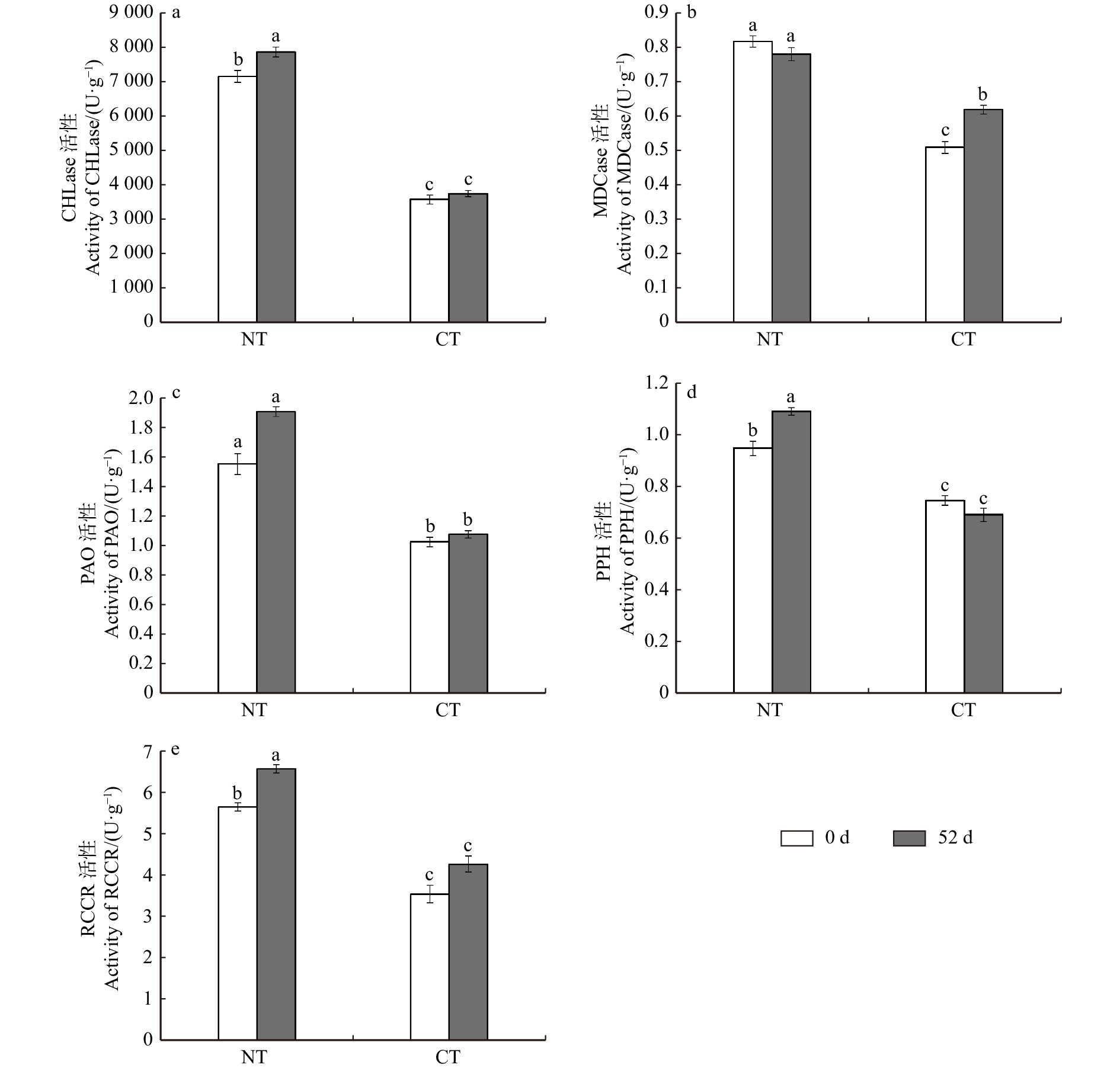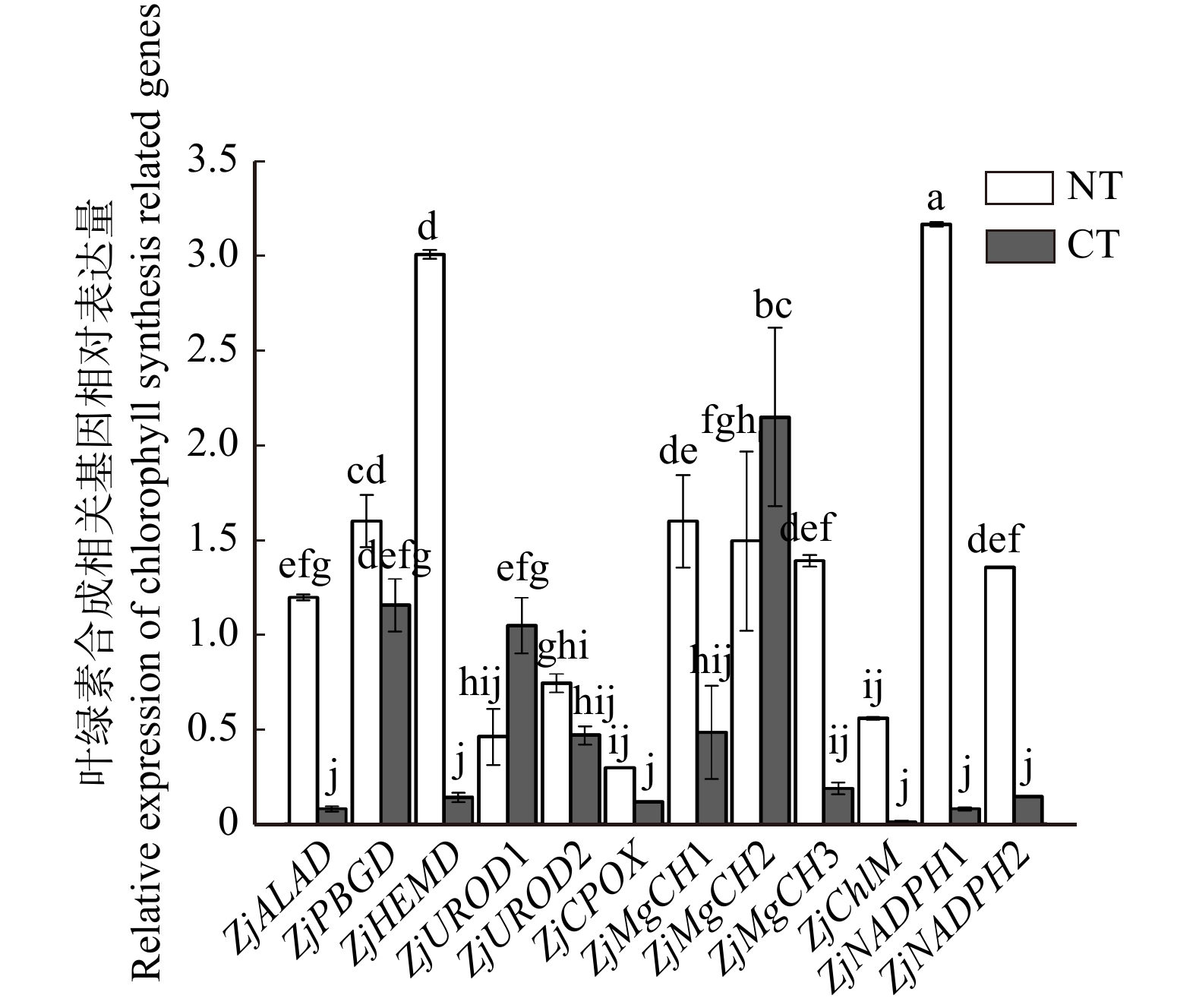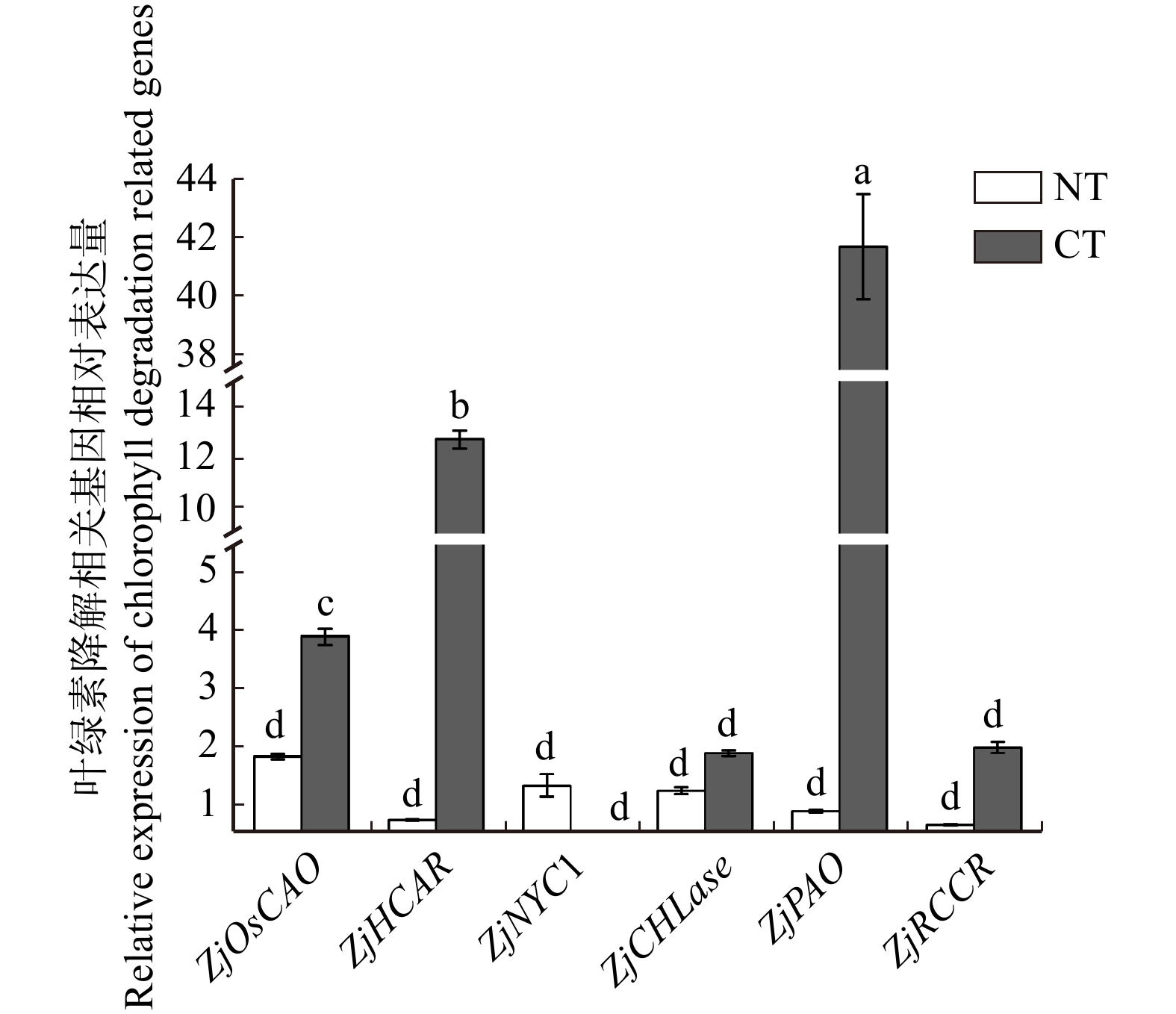Effects of low temperature stress on chlorophyll metabolism of Zoysia japonica
-
摘要:目的 日本结缕草是具有众多优良性状,被广泛应用的暖季型草坪草。通过对其叶绿素合成及降解的研究,探究日本结缕草秋冬季节在我国北方地区较早出现叶片脱绿现象的内源机理。方法 对日本结缕草进行14 h光照(4 ℃)、10 h黑暗(2 ℃)的循环低温处理,并对叶绿素、叶绿素合成与降解途径中重要酶的活性、中间产物含量以及叶绿素代谢相关基因表达量进行测定。结果 研究发现在低温胁迫处理下,日本结缕草叶片表观形态上有明显变化,严重枯黄且卷曲;叶绿素、叶绿素a、叶绿素b的浓度显著下降,叶绿素a与b的比值减小;5-氨基乙酰丙酸盐脱水酶、胆色素原脱氨酶(PBGD)活性和单卟啉胆色素原(PBG)含量显著低于对照组;脱镁鳌合酶(MDCase)活性显著高于对照组;叶绿素合成基因(除ZjMgCH2)均下调表达;叶绿素降解相关基因(除ZjNYC1)均比对照组较高表达。结论 低温胁迫下,日本结缕草叶绿素合成减弱,同时加速了叶绿素的降解。此外,验证了MDCase是日本结缕草叶绿素降解途径中的关键因子。本研究为进一步解决日本结缕草滞绿性状提供了理论基础,也对培育日本结缕草滞绿品种育种工作具有重要意义。Abstract:Objective Zoysia japonica is a warm season lawn grass, which has many excellent characters and is widely used. One of the limiting factors for Z. japonica is its early leaf de-greening in late autumn and early winter in the north. The objective of this study was to investigate the underlying mechanism of leaf de-greening process of Z. japonica in response to low temperature stress.Method In this experiment, Z. japonica was exposed to light for 14 h (4 ℃) and dark for 10 h (2 ℃) in a growth chamber to simulate cold stress. Chlorophyll content, the activities of key enzymes in chlorophyll synthesis and degradation pathway and the expression of genes related to chlorophyll metabolism were studied.Result Z. japonica leaves turned yellow and curly under low temperature stressed conditions. The concentrations of chlorophyll, chlorophyll a, chlorophyll b , the ratio of chlorophyll a to chlorophyll b , the activities of ALAD, PBGD and the content of PBG in low temperature treatment group were significantly lower than CK. The activity of MDCase increased significantly. Chlorophyll synthesis related genes (except ZjMgCH2) were down-expressed and chlorophyll degradation related genes (except ZjNYC1) were high-expressed.Conclusion Chlorophyll synthesis decreases and chlorophyll degradation increases in Z. japonica under low temperature stress. In addition, MDCase is proved to be the key factor in the chlorophyll degradation pathway of Z. japonica. This study provides a theoretical basis for understanding mechanisms underlying the stay-green characters of Z. japonica. At the same time, it has great significance to breeding variety of Z. japonica with stay-green character.
-
Keywords:
- chlorophyll synthesis /
- chlorophyll degradation /
- MDCase /
- Zoysia japonica /
- low temperature stress
-
日本结缕草(Zoysia japonica)作为暖季性草坪草,具有耐践踏、耐粗放管理、节水等优良特性,被广泛应用[1]。但是由于日本结缕草在北方地区秋冬季节较早的出现枯黄现象,观赏价值受到了严重影响,在北方的使用受到了限制。温度是植物生长的重要因素。低温胁迫对植物生长发育产生抑制作用,加快衰老,影响各项生理指标,甚至导致植物死亡。在紫花苜蓿(Medicago sativa)根系呼吸的研究中发现,4 ℃的低温条件下,活性氧的大量积累对细胞造成了伤害,严重影响了根系的生长[2]。同时,在紫花苜蓿种子萌发的研究中发现,10 ℃低温条件下发芽率下降,长期低温胁迫出现幼苗死亡[3]。另外,植物响应低温胁迫产生一系列防御反应,例如抗氧化酶活性提升,渗透调节物质增加等。有结果显示,低温会影响扁蓿豆(Melissilus ruthenicus)抗氧化酶活性和渗透调节物质含量[4-5]。刘建秀老师课题组在日本结缕草抗寒性方面做了大量研究,其中在短期低温胁迫模拟试验中,通过转录组数据分析发现低温会诱导植物脱水和氧化反应,抑制光合作用和物质运输[6]。因此,低温可能是造成植物叶片褪绿的重要原因。近年来对叶绿素代谢的研究越来越丰富,例如,在小麦(Triticum aestivum)的研究中发现2-Cys过氧化还原蛋白通过影响叶绿素代谢从而适应热胁迫[7];叶绿素分解相关基因的表达量与黑麦草(Lolium perenne)耐热性具有正相关性[8];叶绿素合成相关基因过表达,可通过提高5-氨基乙酰丙酸(5-aminolevulinic acid,5-ALA),增加玉簪(Hosta plantaginea)、烟草(Nicotiana tabacum)的叶绿素含量,从而改变叶色[9]。本研究从叶绿素研究角度出发,进行长时间的低温胁迫处理,通过对日本结缕草叶绿素代谢通路关键酶活性、基因表达量的测定,解释低温胁迫导致日本结缕草叶色变化的内源机理。
1. 材料与方法
本试验以日本结缕草“Chinese Common”为试验材料,采自南京农业大学白马科研基地。经分株、移栽、扩繁、养护管理,之后挑选出10盆长势较好且均一的日本结缕草,分为两组(自然生长组,低温处理组,各5盆)。试验分别在人工气候箱和低温培养箱进行52 d的自然生长处理和低温胁迫处理,当两个处理组叶片表型出现明显差异时停止处理。自然生长组(NT)在14 h光照(17600 lx,32 ℃,70% 相对湿度),10 h黑暗(28 ℃,70% 相对湿度)的循环条件下生长。低温处理组(CT)在14 h光照(17600 lx,6 ℃,70% 相对湿度),10 h黑暗(4 ℃,70% 相对湿度)的循环条件下生长。分别对两个处理组处理0 d和52 d的日本结缕草叶片进行采样,测定其叶绿素含量、单卟啉胆色素原(PBG)含量、ALAD活性、脱镁鳌合酶(MDCase)、红色叶绿素代谢产物还原酶(RCCR)、脱镁叶绿酸a加氧酶(PAO)、脱镁叶绿素酶(PPH)、叶绿素酶(CHLase)、PBGD活性以及叶绿素合成与降解相关基因表达量。
1.1 叶绿素含量
利用乙醇提取法[10],使用微量分光光度计等实验仪器,对665、649、470 nm波长处的吸光度进行测定,根据以下公式计算[11]:
Ca=13.95A665−6.88A649 (1) Cb=24.96A649−7.32A665 (2) CL=Ca+Cb=6.63A665+18.08A649 (3) CChl=CL⋅V/m (4) 式中:Ca表示叶绿素a含量;Cb表示叶绿素b含量;CL表示叶绿素总含量;CChl表示叶绿素含量;V表示提取后体积;m表示称取叶片质量。
1.2 PBG含量
参照Bogorad[12]的方法进行测定,其中PBG含量的摩尔消光系数(MEC) = 6.1 × 104 L/(mol·cm)。
1.3 ALAD活性
参照Mauzerall[13]的方法,以不同样品中将δ-氨基乙酰丙 (ALA)转化为PBG含量的多少来表示ALAD活性,需保证向不同样品中加入的ALA等量且过量,活性单位为nmol /(mg·h),蛋白质浓度用布拉德福德方法定量,酶活性以每单位蛋白质为基础表达。
1.4 MDCase、RCCR、PAO、PPH、CHLase、PBGD活性
根据酶联免疫法使用ELISA试剂盒,由上海江莱生物科技有限公司进行测定,对所测定酶活性进行标准曲线矫正。根据双抗体夹心法,使用Rayto RT-6100酶标仪测定各样品450 nm处的吸光度(OD 值)并根据标准曲线计算相应的酶的含量。在本试验中,MDCase标准曲线为y = 67.792x − 6.617 7,R2 = 0.998 6;RCCR标准曲线为y = 690.68x − 77.746,R2 = 0.994 9;PAO标准曲线为y = 145.27x − 15.807,R2 = 0.995 3;PPH标准曲线为y = 119.76x − 9.375 5,R2 = 0.996;CHLase标准曲线为y = 504.14x − 49.954,R2 = 0.995 3;PBGD标准曲线为y = 45.704x − 5.320 9,R2 = 0.995 8。
1.5 基因表达量
使用TaKaRa MiniBEST Plant RNA Extraction Kit[14]试剂盒提取日本结缕草Total RNA。使用PrimeScriptTMRT reagent Kit with gDNA Eraser试剂盒[15]进行cDNA的合成,同时去除基因组DNA。根据Illumina HiSeq 测序的结果(由北京诺禾致源生物有限公司完成),由北京睿博兴科生物技术有限公司设计合成引物,引物序列如表1,使用TaKaRa公司TB GreenTM Premix Ex TaqTM(Tli RNaseH Plus)[16]试剂盒进行RT-PCR。基因表达量结果主要由两个处理组52 d处理后相对于各自处理组处理0 d的表达量进行比较,相对基因表达量计算结果大于1表示基因上调表达,小于1表示基因下调表达。
表 1 目的基因及引物序列Table 1. Target gene and primer sequence目的基因 Target gene 引物序列 Primer sequence Actin-F 5′-GGTGTTATGGTTGGGATGG-3′ Actin-R 5′-CAGTGAGCAGGACAGGGTG-3′ ZjALAD-F 5′-CAGCAGATGAGGCAGAAG-3′ ZjALAD-R 5′-GGCGAAGTAGGTCAGGAT-3′ ZjPBGD-F 5′-GAGTTCTTGGCAGTTCTT-3′ ZjPBGD-R 5′-GCTCCACTTCTTGATGTT-3‘ ZjHEMD-F 5′-TTGAAGGGTGGGTTGAGAGT-3′ ZjHEMD-R 5′-ACATACTAGTAGCTCCATCG-3′ ZjUro-D1-F 5′-GAAGGACACAGGAGTTGATG-3′ ZjUro-D1-R 5′-CCATTACCAAGGCGTCTC-3′ ZjUro-D2-F 5′-ATCCTTACACCACTTCCT-3′ ZjUro-D2-R 5′-CTCATCTCGCAACACATT-3′ ZjCPOX-F 5′-ATCATAGAACGGCGGAAG-3′ ZjCPOX-R 5′-GCAGTAAGTGGAAGAGACA-3′ ZjMgCH1-F 5′-GAACATCCACGCTCTTGA-3′ ZjMgCH1-R 5′-ACTCGCCATAGGTCTTGA-3′ ZjMgCH2-F 5′-CTACCACGCTCAATCCTAT-3′ ZjMgCH2-R 5′-GTCATCCTCCTCTTCATCTT-3′ ZjMgCH3-F 5′-TCTGAGTTGAATGTCGATGG-3′ ZjMgCH2-R 5′-TGACGGTAGCAATATCCTCC-3′ ZjCHLM-F 5′-GGAGAGCCTGAACGGGAGGT-3′ ZjCHLM-R 5′-GGGCGCGAAGCTGATCACCA-3′ ZjNADPH1-F 5′-GAGTCGGCGTTCTTGGGTGT-3′ ZjNADPH1-R 5′-GTCTGCGCACGGATAGCCAC-3′ ZjNADPH2-F 5′-CGCCGTTCCAGAAGTTCATA-3′ ZjNADPH2-R 5′-GAGTCCTTGTTCCAGCTCCA-3′ ZjOsCAO-F F:5′-GCAGCAAGAACGAATGAT-3′ ZjOsCAO-R 5′-CTGAAGAGTGGAAGGAGAA-3′ ZjHCAR-F 5′-CATAACTGGAAGCACAAGAG-3′ ZjHCAR-R 5′-GAGGACAGATTCAGGACTT-3′ ZjNYC1-F 5′-GACACAGCATCCTCAGTA-3′ ZjNYC1-R 5′-ATAGTCCAGCGAGTAACG-3′ ZjCHLase-F 5′-AAATCTGGCTGGTCTGGTCG-3′ ZjCHLase-R 5′-TATCTGAGATCACGCCTGCT-3′ ZjPAO-F 5′-CAGATACGAGCAGCATAC-3′ ZjPAO-R 5′-CAGCAGCACCTAACAATA-3′ ZjRCCR-F 5′-TCACCAACAGCAATCTCA-3′ ZjRCCR-R 5′-TATCTCAGTCTCCTCCATCT-3′ 1.6 数据统计与分析
使用Excel整理数据,SPSS 20进行单因素显著性方差分析,Origin 2018绘制图表。
2. 结果与分析
2.1 形态变化
两组处理的植株,经52 d处理生长形态(如图1)具有不同程度的变化。NT组略有衰老枯黄现象。CT组植株叶片出现严重枯黄且卷曲。
2.2 叶绿素的变化
由图2a可知,NT组52 d叶绿素含量变化不显著;CT组52 d后,叶绿素含量极显著下降(P < 0.01),由5.38 mg/g下降至2.01 mg/g,下降幅度为62.64%。由图2b、c可知,NT组52 d后,叶绿素a和叶绿素b含量没有显著变化;CT组52 d后,叶绿素a和叶绿素b的含量均显著(P < 0.05)下降,叶绿素a由3.08 mg/g下降至0.80 mg/g;叶绿素b由2.29 mg/g下降至1.21 mg/g,叶绿素a下降幅度大于叶绿素b分别为74.06%和47.30%。叶绿素a/b的值(图2d)显著(P < 0.05)下降,下降幅度为50.77%,因此,日本结缕草在受到低温胁迫时叶绿素a的降解速度大于叶绿素b。
![]() 图 2 处理前后不同处理组的叶绿素含量变化不同小写字母表示相同处理组处理前后差异显著(P<0.05)。下同。Different lowercase letters indicate significant difference between before and after treatment in the same treatment group (P<0.05). The same below.Figure 2. Changes of chlorophyll content between different treatment groups before and after treatment
图 2 处理前后不同处理组的叶绿素含量变化不同小写字母表示相同处理组处理前后差异显著(P<0.05)。下同。Different lowercase letters indicate significant difference between before and after treatment in the same treatment group (P<0.05). The same below.Figure 2. Changes of chlorophyll content between different treatment groups before and after treatment2.3 叶绿素合成关键酶的变化
由图3a可知,NT组52 d后ALAD活性略有上升,但变化不显著;CT组52 d后ALAD活性显著(P < 0.05)下降,由3.20 nmol/(mg·h)下降至2.32 nmol/(mg·h)。由图3b可知,NT组52 d后PBGD活性显著(P < 0.05)上升 ,由0.51 U/g上升至0.63 U/g;CT组52 d后PBGD活性略有上升但变化不显著。
2.4 叶绿素合成途径关键物质的变化
由图4可知,NT组52 d后PBG含量显著(P < 0.05)下降,下降了9.10 µmol/g;CT组52 d后PBG含量也显著(P < 0.05)下降,下降了13.00 µmol/g,下降更显著。
2.5 叶绿素降解途径关键酶的变化
由图5a可知,NT组52 d后,CHLase活性显著(P < 0.05)上升,上升了167.04 U/g;低温处理组52 d后,CHLase活性变化不显著。由图5b可知,NT组52 d后,MDase活性变化不显著;CT组52 d后,MDase活性显著上升(P < 0.05),上升了0.11 U/g。由图5c可知,自然生长组52 d后,PPH活性显著(P < 0.05)升高,升高了0.14 U/g;低温处理组52 d后,PPH活性没有显著变化。由图5d可知,52 d后,NT组与CT组PAO活性均略有上升且变化不显著。由图5e可知,自然生长组52 d后,RCCR活性显著(P < 0.05)升高,升高37%;低温处理组52 d后,RCCR活性显著(P < 0.05)升高,升高幅度为19.19%。因此,日本结缕草在低温条件下褪绿反应加速进行。
2.6 叶绿素代谢相关基因表达量的变化
2.6.1 提取总RNA质量浓度的检测
经超微量分光光度计的检测,前期提取出的所有处理组总RNA质量浓度均高于100 ng/μL,A260/A280均在2.0左右,A260/A230均在1.8左右。RNA质量浓度符合后续试验,提取纯度较高。
2.6.2 叶绿素代谢相关基因qRT-PCR及扩增产物验证
当样本引物片段扩增结束,对基因的溶解曲线进行观察,所有样本均具有溶解曲线并仅存在单一特征峰且特征峰初现位置和PCR反应退火反应所示的位置一致。因此,qRT-PCR产物荧光片段符合后期试验需求,试验结果可用于后续分析。
2.6.3 叶绿素合成相关基因表达
本试验对调控叶绿素合成的12个关键基因在两组处理中的表达量进行测定(图6)。结果表明,自然生长组52 d,ZjALAD、ZjPBGD、ZjHEMD、ZjMgCH1、ZjMgCH3、ZjNADPH1、ZjNADPH2基因表达量上升;ZjMgCH2基因表达量几乎没有变化;ZjURO-D1、ZjURO-D2、ZjCPOX、ZjCHLM基因表达量下降。
低温处理组52 d后,ZjPBGD、ZjURO-D1、ZjMgCH2基因表达量上升;ZjALAD、ZjHEMD、ZjURO-D2、ZjCPOX、ZjMgCH1、ZjMgCH3、ZjCHLM、ZjNADPH1、ZjNADPH2基因表达量下降。
2.6.4 叶绿素降解相关基因表达
本试验测定了两个处理组参与调控叶绿素降解及叶绿素循环的6个关键基因的相对表达量(图7)。自然生长组52 d后,ZjOsCAO基因表达量上升;ZjHCAR、ZjNYC1、ZjCHLase、ZjPAO、ZjRCCR基因表达量下降。低温处理组52 d后,ZjOsCAO、ZjHCAR、ZjCHLase、ZjPAO、ZjRCCR基因表达量上升;ZjNYC1基因表达量下降。
3. 讨 论
3.1 低温胁迫对叶绿素的影响
叶绿素浓度是衡量草坪草生长状况、受胁迫程度和观赏价值的重要指标。叶绿素a和叶绿素b作为叶绿素合成产物,对植物叶绿素循环起到重要作用,是植物吸收光能的主要色素物质。叶绿素a是光合作用中心色素分子,通过电子传递,将光能最终转化为化学能;叶绿素b具有吸收和传递光能的作用[17]。植物体内叶绿素a与叶绿素b含量比例的变化会影响其对不同波长光的吸收效率。叶绿素a/b值高,有利于CO2转化为光合产物,提高光合效率[18]。同时叶绿素a/b值还与抗性有关,在不同灌木抗旱性[19],耐盐碱[20]比较的相关研究中发现,抗性强的灌木,叶绿素a/b的值越大。本试验结果显示日本结缕草在低温胁迫下叶绿素、叶绿素a、叶绿素b含量均显著(P < 0.05)下降且叶绿素a的降解速度大于叶绿素b,叶绿素a/b值明显降低。在草坪草的研究中已发现,这可能是由于植株叶片在胁迫作用下发生光化学反应,生成大量O2−·,O2−·在叶片大量积累直接加速叶绿素a的降解,导致叶绿素a/b降低[21]。
3.2 低温胁迫对叶绿素代谢通路中酶活性的影响
结果显示日本结缕草在低温胁迫下抑制了叶绿素的合成,同时促进了叶绿素降解。目前已经在很多种植物的研究中发现叶绿素损失会受到温度的影响,在对玉米低温胁迫的研究发现,低温会抑制叶绿素合成过程中ALA向PBG的转化以及Mg-原卟啉Ⅸ(Mg-proto Ⅸ)到镁原卟啉Ⅸ甲脂(Mpe)的反应到至叶绿素合成减少含量下降,除此之外低温胁迫还会抑制叶绿素 a向叶绿素b的转化[22]。在水稻中的研究发现,低温会造成水稻ALA、Mg-Proto Ⅸ、叶绿素合成受阻,尿卟啉原Ⅲ(Uro Ⅲ)和卟啉环侧连脱羧形成粪卟啉原Ⅲ(Coprogen Ⅲ)产生物质积累,导致叶绿素合成受到抑制[23]。本试验对ALAD活性,PBGD活性和PBG含量进行测定,其中,ALAD在植物叶绿素合成过程中催化ALA向PBG转化;PBGD在植物叶绿素合成过程中催化PBG向Hmb转化;PBG是植物叶绿素合成过程中形成吡咯环前的关键物质。结果显示,NT组ALAD(不显著)、PBGD活性均有上升,CT组ALAD、PBGD(不显著)活性均下降。虽然两个处理组PBG含量均有下降,但CT组的降低的程度更显著。因此低温抑制了日本结缕草叶绿素的合成。
关于叶绿素降解本试验测定了CHLase、MDCase、PPH、PAO、RCCR的活性。其中,CHLase催化叶绿素a转化为脱脂基叶绿素a,开启了叶绿素降解的第一步;MDCase是催化去Mg2+的关键酶;PPH是催化Pein a脱植醇转化为Pheide a的关键酶;PAO是催化Pheide向红色叶绿素代谢产物(RCC)转化的关键酶;RCCR作为叶绿素降解最后褪绿反应的关键酶,催化RCC产生无色、蓝色荧光产物pFCC。在关于银杏叶片[24]、青梅果实[25]叶绿素降解的研究中显示,MDCase是叶绿素降解途径中较为重要的因子。与本试验结果一致,MDCase活性的结果显示,CT组显著上升(NT组略有下降),低温加速了叶绿素降解。在芹菜和菠菜黄化的研究中发现随着叶绿素含量下降,脱植基叶绿素a含量增多,CHLase活性也增加[26-27]。但之后的一些报道显示CHLase不直接参与调控叶绿素降解,例,关于大豆叶片的结果表明低氧可抑制叶片黄化,延缓叶绿素含量降低,但不影响CHLase活性的变化[28];一些果蔬衰老过程中叶绿素酶活性水平的研究显示,CHLase活性随着组织衰老而降低[29-30]。在本试验中结果显示CHLase、RCCR活性两个处理组均有升高,但NT组显著,CT组并不显著,这可能是由于低温胁迫诱导了日本结缕草的衰老从而减缓了CHLase、RCCR活性的升高。黄炳茹老师课题组在匍匐剪股颖热胁迫的研究中对叶绿素合成酶、叶绿素降解酶及相关基因表达量进行了测定,发现PPH是调节热胁迫下叶绿素降解的关键酶[31]。但本研究的结果显示,PPH的活性NT组显著上升,CT组略有下降但不显著。可能是由于PPH在不同植物中的不同胁迫响应过程中对叶绿素降解具有不同作用。
3.3 低温胁迫对叶绿素代谢相关基因表达量的影响
基因表达量结果显示,低温胁迫下叶绿素合成途径中相关基因多数下调表达,降低叶绿素的合成。ZjMgCH2基因呈现上调表达,可能是MgCH家族较为重要的基因,在植物受到严重胁迫或者叶绿素合成能力极低的情况下通过上调表达起到防御作用,以提高叶绿素的合成维持植物体生存生长。但由于植株受到低温胁迫影响,叶绿素合成途径中整体酶活性的降低,最终未达到提高叶绿素合成的效果。
有研究发现,叶绿素降解可能是先由叶绿素b向叶绿素a的转化[32-33]。叶绿素a的含量随着叶绿素降解的加速而快速下降,由于叶绿素循环反应中ZjNYC1下调表达,对叶绿素b向叶绿素a的转化造成了抑制,因此,Ca/Cb将进一步降低。叶绿素降解相关基因大多呈上调表达,加快叶绿素的降解。ZjCHLase和ZjRCCR虽表现为下调表达但由其编码的产物CHLase和RCCR酶活性上升的结果可知,叶绿素降解途径相关基因下调表达的调控机制在低温胁迫下的叶绿素降解过程中响应较为滞后。
4. 结 论
本试验主要研究低温胁迫对日本结缕草叶绿素代谢的影响,通过对叶绿素合成降解通路中关键酶活性,重要中间产物活性以及相关基因表达量的测定。结果显示,低温胁迫不仅使日本结缕草叶绿素合成的速率降低,同时使叶绿素降解的速率加快。二者合力导致低温胁迫下日本结缕草叶绿素、叶绿素a、叶绿素b的浓度以及叶绿素a与叶绿素b的比值均显著下降。除此之外,还发现MDCase是叶绿素降解过程中日本结缕草响应低温胁迫的关键调控因子。本研究为日本结缕草滞绿机理相关研究奠定了基础,对培育日本结缕草优势滞绿品种具有重要意义。
-
图 2 处理前后不同处理组的叶绿素含量变化
不同小写字母表示相同处理组处理前后差异显著(P<0.05)。下同。Different lowercase letters indicate significant difference between before and after treatment in the same treatment group (P<0.05). The same below.
Figure 2. Changes of chlorophyll content between different treatment groups before and after treatment
表 1 目的基因及引物序列
Table 1 Target gene and primer sequence
目的基因 Target gene 引物序列 Primer sequence Actin-F 5′-GGTGTTATGGTTGGGATGG-3′ Actin-R 5′-CAGTGAGCAGGACAGGGTG-3′ ZjALAD-F 5′-CAGCAGATGAGGCAGAAG-3′ ZjALAD-R 5′-GGCGAAGTAGGTCAGGAT-3′ ZjPBGD-F 5′-GAGTTCTTGGCAGTTCTT-3′ ZjPBGD-R 5′-GCTCCACTTCTTGATGTT-3‘ ZjHEMD-F 5′-TTGAAGGGTGGGTTGAGAGT-3′ ZjHEMD-R 5′-ACATACTAGTAGCTCCATCG-3′ ZjUro-D1-F 5′-GAAGGACACAGGAGTTGATG-3′ ZjUro-D1-R 5′-CCATTACCAAGGCGTCTC-3′ ZjUro-D2-F 5′-ATCCTTACACCACTTCCT-3′ ZjUro-D2-R 5′-CTCATCTCGCAACACATT-3′ ZjCPOX-F 5′-ATCATAGAACGGCGGAAG-3′ ZjCPOX-R 5′-GCAGTAAGTGGAAGAGACA-3′ ZjMgCH1-F 5′-GAACATCCACGCTCTTGA-3′ ZjMgCH1-R 5′-ACTCGCCATAGGTCTTGA-3′ ZjMgCH2-F 5′-CTACCACGCTCAATCCTAT-3′ ZjMgCH2-R 5′-GTCATCCTCCTCTTCATCTT-3′ ZjMgCH3-F 5′-TCTGAGTTGAATGTCGATGG-3′ ZjMgCH2-R 5′-TGACGGTAGCAATATCCTCC-3′ ZjCHLM-F 5′-GGAGAGCCTGAACGGGAGGT-3′ ZjCHLM-R 5′-GGGCGCGAAGCTGATCACCA-3′ ZjNADPH1-F 5′-GAGTCGGCGTTCTTGGGTGT-3′ ZjNADPH1-R 5′-GTCTGCGCACGGATAGCCAC-3′ ZjNADPH2-F 5′-CGCCGTTCCAGAAGTTCATA-3′ ZjNADPH2-R 5′-GAGTCCTTGTTCCAGCTCCA-3′ ZjOsCAO-F F:5′-GCAGCAAGAACGAATGAT-3′ ZjOsCAO-R 5′-CTGAAGAGTGGAAGGAGAA-3′ ZjHCAR-F 5′-CATAACTGGAAGCACAAGAG-3′ ZjHCAR-R 5′-GAGGACAGATTCAGGACTT-3′ ZjNYC1-F 5′-GACACAGCATCCTCAGTA-3′ ZjNYC1-R 5′-ATAGTCCAGCGAGTAACG-3′ ZjCHLase-F 5′-AAATCTGGCTGGTCTGGTCG-3′ ZjCHLase-R 5′-TATCTGAGATCACGCCTGCT-3′ ZjPAO-F 5′-CAGATACGAGCAGCATAC-3′ ZjPAO-R 5′-CAGCAGCACCTAACAATA-3′ ZjRCCR-F 5′-TCACCAACAGCAATCTCA-3′ ZjRCCR-R 5′-TATCTCAGTCTCCTCCATCT-3′ -
[1] 李亚, 刘建秀, 向其伯. 结缕草属种质资源研究进展[J]. 草业学报, 2002, 11(2): 7−14. doi: 10.3321/j.issn:1004-5759.2002.02.002 Li Y, Liu J X, Xiang Q B. Progress in zoysiagrasses germplasm resources research[J]. Acta Prataculture Sinica, 2002, 11(2): 7−14. doi: 10.3321/j.issn:1004-5759.2002.02.002
[2] 刘美君, 丁鹿, 王丽娜, 等. 低温胁迫对紫花苜蓿根系呼吸作用的影响[J]. 草原与草坪, 2020, 40(4): 22−26, 33. Liu M J, Ding L, Wang L N, et al. Effect of low temperature stress on respiration of root in Medicago sativa[J]. Grassland and Turf, 2020, 40(4): 22−26, 33.
[3] 高茜, 徐洪雨, 李振松, 等. 低温胁迫对紫花苜蓿种子萌发的影响[J]. 草原与草坪, 2020, 40(4): 34−39, 46. Gao Q, Xu H Y, Li Z S, et al. Effects of chilling stress on seed germination of alfalfa[J]. Grassland and Turf, 2020, 40(4): 34−39, 46.
[4] 李小安, 周青平. 低温胁迫对扁蓿豆的脯氨酸含量和 POD、SOD 酶活性的影响[J]. 青海大学学报 (自然科学版), 2009, 27(1): 60−63. Li X A, Zhou Q P. The effect of chilling stress on SOD, POD activity and proline content of Melilotus ruthenicus[J]. Journal of Qinghai University (Nature Science), 2009, 27(1): 60−63.
[5] 李小安. 低温胁迫对青藏扁蓿豆与和田苜蓿种子游离脯氨酸和可溶性糖含量的影响[J]. 青海大学学报 (自然科学版), 2011, 29(4): 10−13. Li X A. Effects of chilling stress on proline and soluble sugar content of Melilotus ruthenicus and Hetian alfalfa[J]. Journal of Qinghai University (Nature Science), 2011, 29(4): 10−13.
[6] Wei S J, Du Z L, Gao F, et al. Global transcriptome profiles of ‘Meyer’ zoysiagrass in response to cold stress[J/OL]. PLoS One, 2015, 10(6): 0131153 [2020−06−13]. https://doi.org/10.1371/journal.pone.0131153.
[7] Mishra D, Shekhar S, Chakraborty S, et al. Wheat 2-Cys peroxiredoxin plays a dual role in chlorophyll biosynthesis and adaptation to high temperature[J]. The Plant Journal, 2021, 105(5): 1374−1389. doi: 10.1111/tpj.15119
[8] Zhang J, Li H, Jiang Y W, et al. Natural variation of physiological traits, molecular markers, and chlorophyll catabolic genes associated with heat tolerance in perennial ryegrass accessions. [J/OL]. BMC Plant Biology, 2020, 20(1):8[2020−10−13]. https://doi.org/10.1186/s12870-020-02695-8.
[9] Zhang J Y, Sui C H, Liu H M, et al. Effect of chlorophyll biosynthesis-related genes on the leaf color in Hosta (Hosta plantaginea Aschers) and tobacco (Nicotiana tabacum L.)[J]. BMC Plant Biology, 2021, 21(1): 21−45. doi: 10.1186/s12870-020-02811-8
[10] 李合生. 植物生理生化实验原理和技术[M]. 北京: 高等教育出版社, 2000. Li H S. Principle and technology of plant physiological and biochemical experiment[M]. Beijing: Higher Education Press, 2000.
[11] 李晓东, 谭海丽, 尤宏. 海洋酸度变化下孔石莼对农药硫丹的生态响应研究[J]. 中国海洋大学学报(自然科学版), 2019, 49(4): 71−81. Li X D, Tan H L, You H. The research on the ecotoxiology of ocean acidification and endosulfan in Ulva pertusa[J]. Periodical of Ocean University of China (Nature Science), 2019, 49(4): 71−81.
[12] Bogorad L, Colowick S P, Kaplan N O. Methods in enzymology 5[M]. New York: Academic Press, 1962: 885−891.
[13] Mauzerall D, Granick S. The occurence and determination of δ-aminolevulinic acid and porphobilinogen in urine[J]. Biological Chemistry, 1956, 219: 435−446. doi: 10.1016/S0021-9258(18)65809-0
[14] Takara Biomedical Technology. TaKaRa mini BEST plant RNA extraction kit[EB/OL]. [2020−10−15]. http://www.takarabiomed.com.cn/DownLoad/9769.pdf.
[15] Takara Biomedical Technology. PrimeScript TMRT reagent kit with gDNA eraser (Perfect Real Time)[EB/OL]. [2020−10−15]. http://www.takarabiomed.com.cn/DownLoad/RR047A.pdf.
[16] Takara Biomedical Technology. TB GreenTM Premix Ex TaqTM (Tli RNaseH Plus)[EB/OL]. [2020−10−15]. http://www.takarabiomed.com.cn/DownLoad/RR420A.pdf.
[17] 周黄磊, 黄升谋. 库源关系对水稻叶绿素含量及叶绿素a/b值的影响[J]. 绿色科技, 2017(24): 147−149. Zhou H L, Huang S M. Effects of sink source relationship on chlorophyll content and photosynthetic characteristics of rice[J]. Green Technology, 2017(24): 147−149.
[18] 李利红, 李先芳, 马锋旺. 杏树花芽分化期叶绿素含量·比叶重和叶绿素a/b的研究[J]. 安徽农业科学, 2006(19): 4917−4918, 4920. doi: 10.3969/j.issn.0517-6611.2006.19.048 Li L H, Li X F, Ma F W. Study on the content of chlorophyll, the variation of SLW and the value of chlorophyll a/b in differentiation[J]. Journal of Anhui Agricultural Sciences, 2006(19): 4917−4918, 4920. doi: 10.3969/j.issn.0517-6611.2006.19.048
[19] 邵麟惠, 杨占武, 于应文, 等. 柴达木盆地6种灌木主要渗透调节物质分布特征和抗旱性研究[J]. 草原与草坪, 2007(1): 19−23. doi: 10.3969/j.issn.1009-5500.2007.01.005 Shao L H, Yang Z W, Yu Y W, et al. Distribution characteristics of mainly osmotic adjustment substance of six shrubs and their drought-resistance in Tsaidam Basin[J]. Grassland and Turf, 2007(1): 19−23. doi: 10.3969/j.issn.1009-5500.2007.01.005
[20] 赵明范, 葛成, 翟志中. 干旱地区次生盐碱地主要造林树种抗盐指标的确定及耐盐能力排序[J]. 林业科学研究, 1997, 10(2): 87−91. Zhao M F, Ge C, Zhai Z Z. Determination of salt resistance index and sorting of salt tolerance ability of main afforestation tree species in secondary saline-alkali land in arid[J]. Forestry Scientific Research, 1997, 10(2): 87−91.
[21] 伍泽堂. 超氧自由基与叶片衰老时叶绿素破坏的关系(简报)[J]. 植物生理学报, 1991(4): 277−279. Wu Z T. Relationship between superoxide radical and chlorophyll destruction during leaf senescence (brief report)[J]. Journal of Plant Physiology, 1991(4): 277−279.
[22] 毛晶晶, 李泽娇, 赵雨晴, 等. 低温胁迫对玉米转绿过程中叶绿素生物合成的影响[J]. 四川农业大学学报, 2019, 37(5): 617−622. Mao J J, Li Z J, Zhao Y Q, et al. The effects of low temperature on chlorophyll synthesis during greening of maize[J]. Journal of Sichuan Agricultural University, 2019, 37(5): 617−622.
[23] 韩巧红. 低温胁迫对水稻叶绿素生物合成及叶绿体发育的影响[D]. 雅安: 四川农业大学, 2017. Han Q H. Effects of low temperature stress on chlorophyll biosynthesis and chloroplast development in rice[D]. Ya’an: Sichuan Agricultural University, 2017.
[24] Tang L, Okazawa A, Fukusaki E, et al. Removal of magnesium by Mg-dechelatase is a major step in the chlorophyll-degrading pathway in Ginkgo biloba in the process of autumnal tints[J]. Ztschrift Für Naturforschung C, 2000, 55(11−12): 923−926.
[25] 王阳光. 采后青梅果实叶绿素降解机制及保绿措施的研究[D]. 杭州: 浙江大学, 2003. Wang Y G. Study on chlorophyll degradation mechanism and green preservation measures of postharvest green plum fruit[D]. Hangzhou: Zhejiang University, 2003.
[26] Yamauchi N, Watada A E. Regulated chlorophyll degradation in spinach leaves during storage[J]. Journal of the American Society for Horticultural Science American Society for Horticultural Science, 1991, 116(1): 58−62. doi: 10.21273/JASHS.116.1.58
[27] Yamauchi N, Watada A E. Pigment changes in parsley leaves during storage in controlled or ethylene containing atmosphere[J]. Journal of Food Science, 2010, 58(3): 616−618.
[28] Fang Z, Bouwkamp J C, Theophanes S. Chlorophyllase activities and chlorophyll degradation during leaf senescence in non-yellowing mutant and wild type of Phaseolus vulgaris L.[J]. Journal of Experimental Botany, 1998, 49: 503−510.
[29] Minguez-Mosquera M I, Gallardo-Guerrero L. Role of chlorophyllase in chlorophyll metabolism in olives cv. Gordal[J]. Phytochemistry, 1996, 41(3): 691−697. doi: 10.1016/0031-9422(95)00708-3
[30] Almela L, Fernández-López J A, Marı́a J R. High-performance liquid chromatographic screening of chlorophyll derivatives produced during fruit storage[J]. Journal of Chromatography A, 2000, 870(1): 483−489.
[31] Jespersen D, Zhang J, Huang B R. Chlorophyll loss associated with heat-induced senescence in bentgrass[J]. Plant Science, 2016, 249: 1−12. doi: 10.1016/j.plantsci.2016.04.016
[32] Kaewmanee T, Benjakul S, Visessanguan W. Effect of salting processes on chemical composition, textural properties and microstructure of duck egg[J]. Journal of the Science of Food and Agriculture, 2010, 89(4): 625−633.
[33] 邹强, 赵婷, 朴一龙, 等. 野生软枣猕猴桃冷藏期间生理变化与叶绿素降解相关性研究[J]. 食品工业科技, 2012(23): 318−320, 353. Zou Q, Zhao T, Piao Y L, et al. Study on the relationship between physiological changes and chlorophyll degradation of Actinidia arguta Sieb. et Zucc during cold storage[J]. Food Industry Science and Technology, 2012(23): 318−320, 353.







 下载:
下载:
